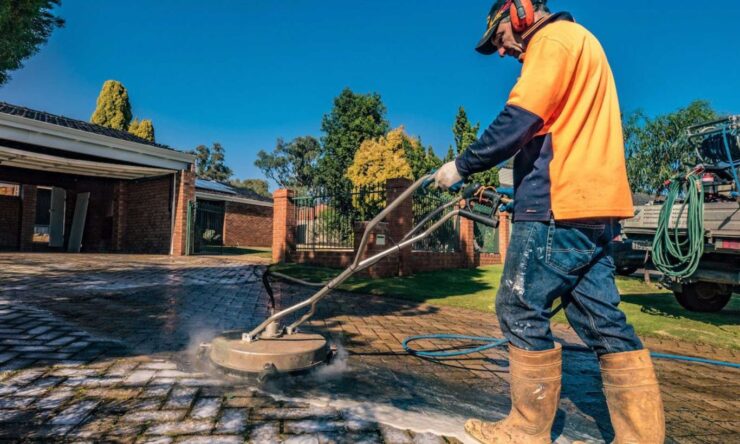After years of exposure to the sun, rain, snow, oil spills, heavyweight and pressure from vehicles, and wild growth, the driveway can develop cracks, become dingy, and look neglected and messy. And it is not just about the looks. Lack of maintenance of the driveway can lead to safety issues and property damage, potentially costing the owners heavily. So, how does one fix these issues? Many homeowners might directly jump to replace the entire pavement with new tiles or concrete, which might end up being expensive. For most of these scenarios, driveway cleaning by power washing is a better option.
Scenarios That Require Driveway Maintenance
Replacing a driveway involves removing the old concrete, tiles, or pebbles from the entire driveway and installing a new set of tiles or concrete, which is elaborate and expensive. Power washing is the process where services use high power water sprays and chemicals to clear deep stains, grease, weeds and other materials that have penetrated deep into the concrete.
1) Driveway with oil stains and tire marks
Driveways are the most used part of the house, which see vehicle movement every day. Regular driving on concrete surfaces can cause tire marks on the floor. Driveways are also used to do routine maintenance and repair work on the car, leading to oil spills and transmission fluid spills. Driveway cleaning can fix these issues. A professional driveway cleaner uses pressure washing to clean the tire marks and dirt on the floor. However, for oil spills, pressure washing is not recommended as it can push oil deeper into the floor’s surface, which will affect the floor strength. Driveway cleaners wash the floor with chemical solvents which can absorb the oil and make the surface clean.
2) Driveways with cracks
Driveways often develop small cracks on the floor. Extreme weather conditions tend to make tiny holes or cracks in the surface of the driveway floor, through which water and dirt particles can seep; when cold winters arrive, this water inside the flooring freezes, which leads to its expansion, causing cracks in the floor. Regular cleaning of the surface helps dust accumulation and water seepage. For cracked floors, surface coatings are available, filling these gaps and giving a new look to the floor. Some of these coatings also have water repellent properties that prevent water seepage into the floor. It is recommended that the surface is adequately cleaned before installing these coatings.
3) Slippery driveways due to moss/algae growth
Moss or algae growth is often observed when concrete surfaces experience hot and humid conditions. It can cause the driveway to become slippery. The algae penetrate the surface and can cause structural damage to the flooring. Pressure washing can remove moss and algae that get accumulated on the flooring and helps prevent any floor damage. Washing also removes moisture on the floor, which reduces the chance of algae growth in the future.
4) Driveway with multiple potholes, drainage issues and spiderweb cracks
When the driveways develop deep potholes that gather rainwater and damage the foundation, it is time to thoroughly clean and replace the tiling. Interconnected cracks, broken drainage systems, and seeping issues might lead to long-term damage to the property, where a complete replacement of the driveway would be necessary after thorough cleaning and repair.
Having the driveway cleaned regularly is an integral part of house maintenance. Driveway cleaning is a better option for most of these scenarios except when the pavement is heavily damaged. It is an easy, quick, economical, safe and effective way to bring the pavement back to its former glory.




























